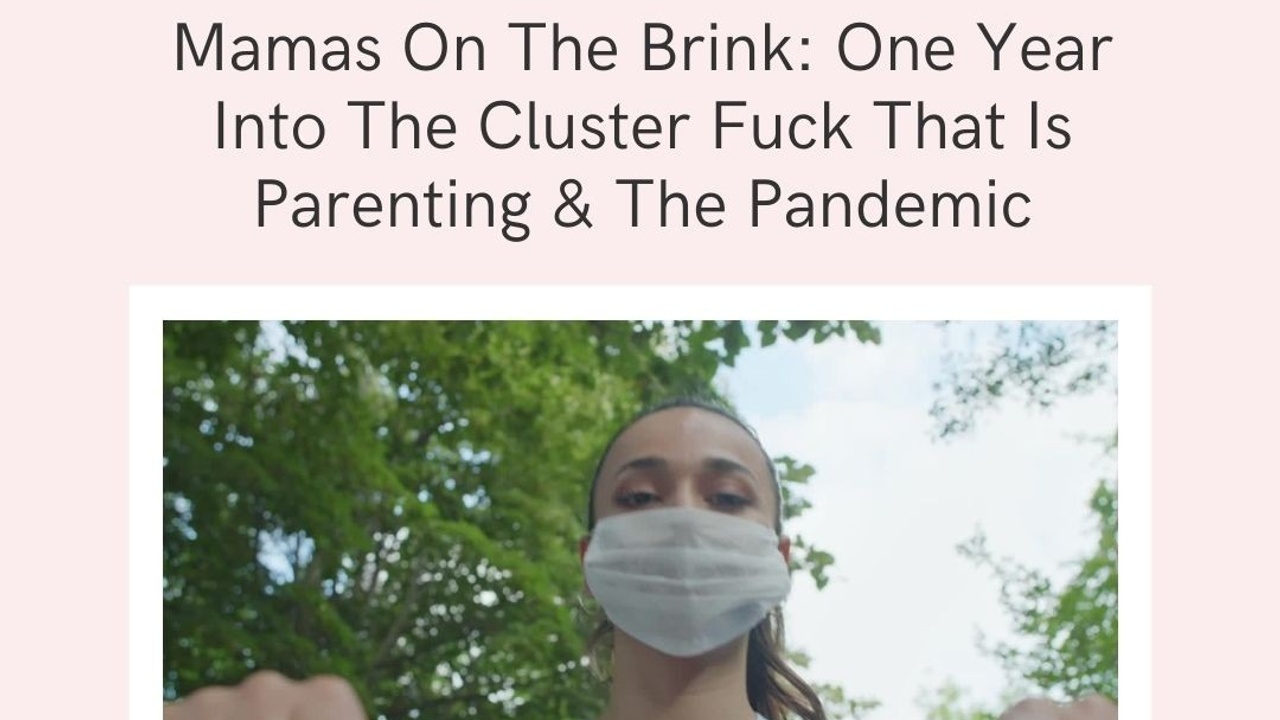Mamas On The Brink: One Year Into The Cluster Fuck That Is Parenting & The Pandemic
Mar 24, 2021
Moms are not okay. Here’s some gentle ways to ease anxiety
Bleary-eyed and stumbling from the comfort of my queen bed to the nursery, for yet another night feed. By some miracle, the baby eats and within minutes falls blissfully back to sleep.
Not me.
This is when it’s the worst, the endless loop.
Racing thoughts about credit card payments, my son’s speech challenges and whether kids at school will make fun of him (he’s only three), and oh yeah, COVID-19.
Hey, I’m JJ , and for the first time ever, I’m going to admit something here I’ve shared with no one: I am barely hanging on.
I know I’m far from special - the cluster fuck that is parenting and the pandemic has been making headlines for months.
The New York Times started a series called The Primal Scream, putting into print what so many of us are feeling: moms are in crisis and no one is listening. They even opened up a phone line, urging women to call and vent unfiltered and unashamed.
(It’s on my to do list).
Overwhelmed af. Tired af. One year into this f*cked up new normal with seemingly no end in sight, I finally did something.
I reached out to Mom Halo resident and scholar, Dr. Tanya Cotler.
I recently called her from my laundry room while the baby napped and the toddler watched PJ Masks for the millionth time. Phone cradled under my chin, notebook propped up on the dryer, ready for all the wisdom.
In her naturally soothing voice, Cotler said six simple words: “It’s okay to not be okay.”
The clinical psychologist and mom of three says many of her patients are reporting more anxiety and depression. She often uses an analogy - getting patients to imagine they are holding a number of fragile glass balls.
Moms, she says, are a crystal bowl.
“If YOU shatter, the balls all fall anyway,” she says.
In other words, as impossible as it feels, we’ve got to look out for us, too.
Parenting and the pandemic, for me it’s felt like a repetitive punch to the gut. My second baby arrived just as the first case of COVD hit Ontario and I’ve been struggling ever since; is this stress ‘normal’ or is it something more?
Check in, she says, and ask yourself:
- Is my worry and fear controlling me, rather than me controlling it?
- How intense is it?
- How long lasting has it been - days, weeks, months?
- Is it affecting my quality of life?
“You’re always going to have a level of worry or fear, particularly when there is good reason for it,” says Cotler. “But if it’s controlling you, you can’t get it under control, you can’t find a way to cope with it, and it’s really overwhelming, then you might want to seek help.
Help can be big - reaching out to a therapist; or small, like carving out five-minutes of self-care everyday (brushing your teeth does not count, ladies).
Cotler offers five key coping strategies:
Anchor in your values.
Ask yourself, what kind of mom do I want to be? Anchor in your values and surround yourself with a supportive crew.
“Particularly during a pandemic, when there are no right answers, we need to figure out, ‘what feels good to me? What are we feeling comfortable with - that’s the social support network we want to look for,” she says.
Set up weekly digital dates with your chosen support and stick to it.
Protect your space.
Limit news and social media. It may be tempting, but there is really no reason to follow every parenting account on Instagram, or tune into Doug Ford’s announcements on the daily. Taking a breather is okay.
Focus on the now.
One of the biggest triggers right now is all the unknowns.
Cotler says as soon as you notice those racing ‘what if’ thoughts, instead try ‘not now.’ Dial into things you control in the moment: washing your hands, wearing a mask, or getting your baby on a sleep schedule (send me all the tips!).
Name your anxiety.
Start to think of anxiety as a visitor in your space, and call it when you see. “Sometimes pausing and naming it really helps to normalize it,” says Cotler.
She says physical signs of anxiety can include a ‘body buzz’ feeling, racing heart, or excessive thoughts that you can’t control.
CAMH offers an extensive list of resources, including signs and symptoms here.
Seek help.
Sometimes you just need more help, there’s no shame in that game.
“A good mother gets depressed. A good mother can feel hopeless,” says Cotler. “You deserve to feel joy and find pleasure in things, and you deserve to have help, if that becomes difficult to do.”
It all takes work, but it’s worth it. The crystal bowl, remember?
JJ is a mama of two, freelance writer, producer, copy-editor, and content creator. Connect at [email protected]
Stay connected with news and updates!
Join our mailing list to receive the latest news and updates from our team.
Don't worry, your information will not be shared.
We hate SPAM. We will never sell your information, for any reason.


